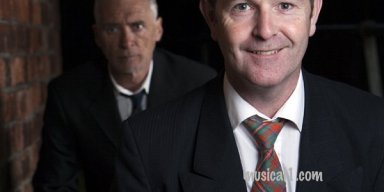Peerie Willie Johnson, the legendary Shetland musician and guitarist, died 22 May 2007 aged 86. By way of a tribute here are the lyrics to Michael's song about William Henry Johnson. The song has now been recorded by Michael and is the opening track on his new "Quintet" CD now available at the store.
"Schenectady Calling Peerie Willie Johnson"
Schenectady calling Schenectady calling
Take these notes into the night
And run then by the Northern Lights
Transport these golden bars
Let this music touch the stars
And snuggle down into the noost
Whaur Peerie Wille makes his hoose
And let his music run through his fingers
Let it touch his very soul
Schenactady calling Schenactady calling
And let the cymbals tingle in a distant ear
And the signal twinkle by the Bressay Pier
In that long dark night let Eddie Lang be near
This sophisticated man
And so to Willie Harlem speaks
His fingers painting what his soul recieves
Blessed Django comes to call
Smashing down those foolish walls
The signal flies into the night
And flashes by the Lerwick lights
A nice explosion runs through his fingers
And ignites his very soul
Schenectady calling Schenectady Calling
We love you madly
Schenetady calling
Lyrics - Copyright Michael Marra
We have also made available in the Audio Section a couple of recordings of Michael singing "Schenectady Calling Peerie Willie Johnson".The first featuring Dundee poet Don Patterson on guitar, the second has Steve Ketley from the the Cauld Blast Orchestra on saxophone. Here is Michael performing his song -
Appreciation: Willie Johnson
Wednesday May 30 Scotsman, The
By Alastair Clark
"PEERIE" WILLIE JOHNSON Guitarist
Born: December, 1920, in Hella, Shetland. Died: 23 May, 2007, in Lerwick, Shetland, aged 86.
WE HAVE had two great Willie Johnsons of seminal importance in traditional music. There was "Blind" Willie Johnson, a black blues singer born in Texas at the start of the 20th century, and there was "Peerie" Willie Johnson, born some 20 years later on the island of Yell. They had at least a couple of qualities in common: both were stunning guitarists, and both liked a good drink under their belt.
If "Blind" Willie's music was hugely influential in the spectacular explosion of the blues in the Thirties and Forties, "Peerie" Willie's was equally so in the pulsating, burgeoning bloom of traditional Shetland music and beyond from the Fifties until the present day.
"Peerie" Willie did the unthinkable: he brought jazz into folk music. The chords he learned as he huddled over the sounds of America, first from Joe Venuti and Eddie Lang, and later from Django Reinhardt and Stephane Grappelli, Charlie Parker, Dizzy Gillespie and Coleman Hawkins, have found their way into just about every folk band playing in Scotland today.
Johnson's father, a seaman, died when Willie was seven and was buried in Jamaica. Johnson was a sickly child whose education was severely hampered by absence from school, scarlet fever being just one of the reasons. His mother, after moving to Lerwick and recognising a bit of music in him, bought him a ukulele, and he was playing it nicely within months. The guitar followed, and the sick child was soon showing signs of not really needing a high school education.
But it was Venuti, swinging American fiddler, and Lang, propulsive rhythm guitarist, who kick-started his musical journey. Johnson, as a young man, would join Tom Anderson, who knew a thing or two about radio, having built some of the first radios in the Shetlands, for jazz sessions broadcast from Schenectady, in New York State, and picked up via the American Forces Network.
Venuti and Lang were a revelation, with so much going on behind an often simple theme. There were LP records too, of course, and Johnson, who never learned to read music but also became a proficient jazz pianist, would, according to his Shetland contemporary Billy Kay, "just listen endlessly, over and over again, to those jazz records".
Johnson, blessed with a huge mop of hair that stuck in there until the day he died, as well as a marvellous ear for music, was soon playing fluent, swinging jazz, revelling in what were then regarded as crazy chord changes. When he and Anderson, best known for his traditional music on fiddle, but a bit of a swinger in his younger years, began to concentrate on Shetland's music, Johnson was reluctant to kick his jazz-chord habit. "I had to keep it very basic at first with Tom," he once told me. "Nothing fancy, because he wanted it that way. In any case, you can't put a lot of thirteenths and flattened fifths into Shetland reels - it takes away from it, in my opinion. But later on, especially when we went to America, I started doing a lot of flattened-fifth things, and Tom came round eventually."
I remember telling him that the old Dixieland man Eddie Condon had said: "We don't flatten our fifths - we drink 'em."
"Well," he replied. "That makes me a damn sight luckier than Eddie Condon, because I flatten my fifths and drink 'em too."
As well his fruitful musical relationship with Anderson - the two went on a vast tour of the United States with the Boys of the Lough in 1979 and got to play at the very hall from which those scratchy sounds had come way back in the Thirties: in Schenectady - Johnson also played and toured with another fine Shetland fiddler, Willie Hunter. He was a favourite accompanist of Aly Bain, who told me on news of his death: "Up there in Shetland and anywhere else, they will never see his like again."
Perhaps the best thing Bain and Johnson did together was a version of Patrick Shuldam-Shaw's Margaret's Waltz, on Bain's first solo album in 1984. Johnson's probing, invigorating guitar pushes Bain to extraordinary heights of sheer, irresistible musical joy. The comedian Billy Connolly was one among many who told Bain it had "No 1 hit" written all over it, but Bain somehow didn't think it would stand up in the pop charts.
In approaching this piece, I suddenly realised that I knew "Peerie" Willie only as a lovely man and a remarkable musician. It turns out, according to Billy Kay, that's precisely what he was. He never had any other kind of career; he took a variety of jobs in Shetland, but never stayed long in them. He simply wanted to play music, that's all.
During the Second World War, he was assigned to the RAF and posted first to Sumburgh and then to Sullom Voe (long before the oil arrived).
Shetland was seen as a vulnerable point, with Hitler already in Norway. So a huge body of troops was sent up, at one point numbering some 30,000.
The War Office dispatched top musicians to entertain our boys, and Johnson was there to greet them and play fabulous guitar with them. They were suitably impressed, and tried to persuade him to head for London when the war was over. There were so many dance bands just itching to have that Willie Johnson guitar rhythm behind them. When the time came, Johnson did a few gigs down south, failed to show up for a lot more, and headed back to Shetland.
Sure, there was glory. There were tours, big-time concerts and TV shows with Bain, festivals in the US and Scandinavia, but, somehow, he always seemed happiest at his customary old crouch over the guitar at the Lounge, in Lerwick.
He was the most modest of hugely gifted, music-changing musicians.
His wife, Ethel, predeceased him. They had no children.
(c) 2007 Scotsman, The. All rights Reserved.










